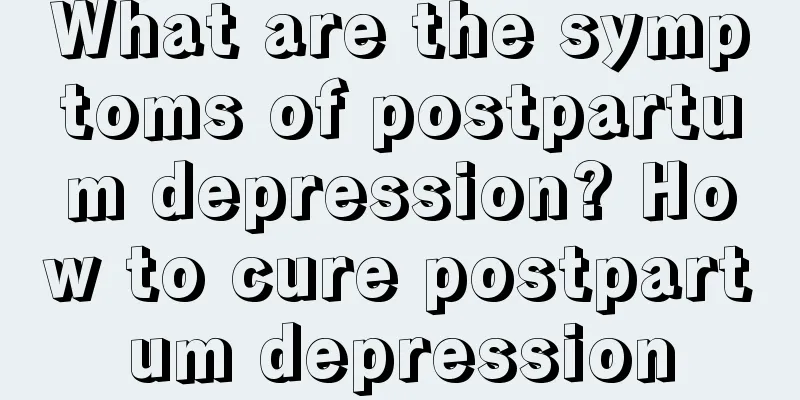What are the symptoms of postpartum depression? How to cure postpartum depression

|
Many mothers experience postpartum depression after giving birth. This is a relatively normal phenomenon. It is usually because they are weak after giving birth and there is no one to help take care of the baby, which creates tremendous pressure. So what are the symptoms of postpartum depression? How to cure postpartum depression? What are the symptoms of postpartum depression?The main manifestations of postpartum depression are: emotional changes, such as depression, frustration, indifference, and even anxiety, fear, irritability, which worsens at night, and sometimes manifests as loneliness, unwillingness to see people, or sadness and tears. Or there is self-abandonment, hostility towards people around, reduced initiative, lack of confidence in life, feeling that life is meaningless, anorexia, sleep disorders, fatigue, and sometimes falling into confusion or drowsiness. Frequent inferiority and self-blame will show upset, dislike everything, and the temper may become very bad. When you find symptoms of postpartum depression, you must not stay at home alone. You can find friends to communicate more, do things you like to do, or go to a local regular hospital for examination and treatment. Timely treatment is still very effective. If you suffer from postpartum depression, you need timely psychological intervention and drug treatment. How to cure postpartum depression1. Participate in newborn care courses and master the skills of taking care of your baby. Many hospitals offer newborn care courses to teach newborn care, maternal and infant nutrition, and other knowledge, which can help new mothers learn the skills of taking care of newborns and better adapt to the role of mother. 2. Find companions and learn from each other. As new mothers, you can better understand the difficulties and moods you encounter after becoming a mother. By communicating and learning with each other, you can get some emotional support and regulate negative emotions. 3. Exercise appropriately to regulate your emotions. Exercise is a good way to relieve negative emotions. New mothers can try walking, postpartum exercises and other exercises according to their physical recovery to relax their body and mind through physical exercise. 4. Understand family medical history and take early prevention measures. For pregnant women with a family history of depression, they should pay more attention to understanding the relevant knowledge of depression and take preventive measures. What causes postpartum depression?There are two main reasons for postpartum depression, physiological factors and external factors. Some studies have shown that after giving birth, the hormone content in women's bodies drops sharply, which will affect women's depression. During pregnancy, women's hormone secretion is vigorous, and the hormone content fluctuates greatly after giving birth, which will affect women's mood and make them very unstable, and they are prone to postpartum depression. After giving birth, women will have many complications in their bodies. Whether it is the pain of natural childbirth or the pain of cesarean section, it is unbearable. After giving birth, lochia and other symptoms may also occur. Long-term interference by pain will affect the mood of the mother, and it is easy for the mother to be negative and irritable. After a woman gives birth, the husband's lack of company and care will also lead to a large psychological gap in the woman. Under the influence of hormones, depression and negative emotions will occur. If the family members are not there to enlighten the mother in time, the mother's mood will be even lower. The deterioration of the relationship between husband and wife will hurt the fragile heart of the woman and cause depression. How long does postpartum depression last?1. The duration of postpartum depression in women varies from person to person, and is largely related to the postpartum living environment and whether psychological intervention is carried out, so it cannot be generalized. 2. It is important for women with postpartum depression to seek medical treatment and intervention as soon as possible. Family members can find out that women with postpartum depression tend to be depressed early. Through early psychological counseling and intervention, combined with medication and other methods if necessary, this kind of postpartum depression will last for a shorter period of time. It is possible that after the puerperium, or in three or two months, this kind of negative emotion will be alleviated or completely disappear. 3. If a woman's postpartum depression is more serious and is assessed to be moderate or severe, its duration will also increase, and it may last for a year or longer without being cured. Therefore, postpartum depression must be detected and treated early. If such negative emotions persist for a long time, it will not only affect your physical and mental health, but also make it impossible to take better care of your growing baby. |
<<: Can pears be eaten cooked? What are the effects and functions of eating cooked pears?
>>: How to have a smooth birth? How to have a smooth birth?
Recommend
What brand of shoes do Neinei wear in "Where Are We Going, Dad?"
In the fifth season of Where Are We Going, Dad?, ...
How can women prevent cervical cancer?
Cervical cancer is a serious gynecological diseas...
Prevention measures for childhood obesity Standards for childhood obesity
Usually most children are thin, and there are rel...
Is Blue Moon laundry detergent good for washing underwear? Can Blue Moon laundry detergent sterilize underwear?
When I use Blue Moon to wash clothes, I find that...
Why does my period not come after I give birth? How long does it take for my period to come after I give birth?
Many new mothers have abnormal periods after givi...
The main reason for infant spitting up milk and the treatment method for infant spitting up milk
Usually, many babies will spit up or spit up milk...
How to correct a child sleeping with his mouth open Reasons why babies sleep with their mouths open
Everyone has different sleeping habits. Some peop...
How long does it take to fully charge a Philips electric toothbrush? What does the beeping sound mean when a Philips electric toothbrush is charging?
Electric toothbrushes are really good to use, but...
How is Xubeier milk powder? Which country is Xubeier milk powder from?
How much do you know about milk powder? Today, le...
Can babies eat fish when they have a cough and phlegm? Can eating fish help relieve cough and reduce phlegm?
Many people like to eat fish. Some people say tha...
What should I do if I have corpus luteum deficiency? How can I treat corpus luteum deficiency with diet?
Corpus luteum deficiency refers to insufficient s...
Does the child snore because he is sleeping soundly? What is the reason for the child snoring?
Sometimes children snore, and parents just think ...
At what age can a baby use a pacifier? Can a baby sleep with a pacifier in his mouth?
The function of a pacifier is to soothe the baby&...
Can't have a baby with polycystic ovary? Pregnancy with polycystic ovary requires choosing the right time
Polycystic ovary syndrome can affect women's ...
How to effectively prevent baby choking? What are the misunderstandings about first aid for baby choking?
Because babies have small throats, it is easy for...









